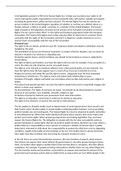A UK legislation passed in 1998 is the Human Rights Act. It helps you to protect your rights in UK
courts and requires public organisations to treat everybody fairly, with justice, equality and respect,
including the government, police and local councils. The Human Rights Act may be used by any
person resident in the United Kingdom regardless of whether or not they are a British citizen or a
foreign national, a child or an adult, a prisoner or a member of the United Kingdom. The human
rights included in this legislation are based on the articles of the European Convention on Human
Rights. The Act "gives further effect" to the rights and freedoms guaranteed under the European
Convention. This means that judges must review and give effect to other laws in a manner that is
consistent with the rights of the Convention and that it is illegal for a public authority to act in a
manner that is incompatible with the rule of the Convention.
Protected acts:
The right to life: by statute, preserves your life. Suspicious deaths and deaths in detention must be
handled by the state.
The prohibition of torture and inhuman treatment: no matter what the situation, you can never be
abused or treated in an inhuman or degrading way.
Protection against slavery and forced labour you should not be treated as a slave or subjected to
forced labour.
The right to liberty and freedom: you have the right to be free and, for example, if you are guilty of a
crime, the state can only imprison you for very good reason.
The right to a fair trial and no sentence without a law: unless proved guilty, you are innocent. You
have the right to hear the facts against you in a court of law if you are convicted of a crime.
Respect for privacy and family life and the right to marry: Safeguards your life from unwanted
monitoring or interference. The right to marry and enjoy family relationships is yours.
Freedom of thought, religion and belief: you can believe what you like and practise your religion or
beliefs.
Free speech and peaceful protest: you have the right to speak freely and to respectfully engage with
others, to share your opinions.
No discrimination: The rights of everyone are equal. You should not be discriminated or treated
because of your gender, race, disability, sexuality, religion or age.
Protection of property: Defends your possessions from state intervention.
The right to an education: means that no child can be denied an education.
The right to free elections: it must be free and fair to hold elections.
The Act applies to all public bodies (such as departments of central government, local councils and
NHS Trusts) and to all other public or private bodies conducting public functions, such as providing
publicly funded care and running jails. The Human Rights Act must be observed by public authorities
in everything they do. When they make individual decisions about anyone, they must respect and
protect your human rights. When preparing programmes and making legislation, they must also
respect the Human Rights Act. The obligation to comply with the Act does not explicitly relate to
private individuals or corporations that do not perform public functions. But there are cases where a
public body has a responsibility to stop a person or company's violation of human rights. A public
body that is informed of child abuse has a responsibility to protect the child from cruel or degrading
conditions. Legally enforceable are the privileges in the Act. This implies that if a person feels that
their rights have been violated, they may bring the company involved to court.
In the UK, there are several humanitarian measures. We have freedom of speech, which ensures
that citizens can express their views without the government or any other groups having to harass
them. As workers often begin to whistle-blow if they see that there is corruption, this often affects
workplaces. For example, if people are being mistreated or whether there are any other illegal acts.
This also involves media and journalism, as journalists can expose and examine the actions of the
government and company and be able to publish them as long as they are real. While people in the




